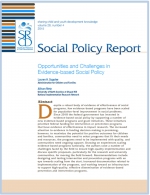From "Opportunities and Challenges in Evidence-Based Social Policy," a report from Lauren H. Supplee (ACF) and Allison Metz (FPG's National Implementation Research Network)
"Over the past thirty years an explosion of research has looked at the impact of social programs designed to improve outcomes for children and families. However, few evidence-based programs have been truly scaled for population-level impact on social problems... Evidence-based policy, a concept borrowed from the health sciences, involves integrating the best scientific knowledge, clinical experience, and input from clients in order to choose the best course of action for addressing a problem." see page 3 for more
From "Moving Research Evidence from the Fringe to the Mainstream in Social Policy,"
commentary by Brian K. Bumbarger (Prevention Research Center, Penn State University)
"There is plenty of good science that doesn’t make the policy/practice leap; there is plenty of social policy that isn’t grounded in any science whatsoever; and just as importantly, there are plenty of timely and important social policy questions for which there is no informative science." see page 17 for more
From "The Importance of Quality Implementation in the Wide-scale Use of Evidence Based Programs," commentary by Celene Domitrovich (CASEL: Collaborative for Academic, Social, and Emotional Learning) and Joseph A. Durlak (Loyola University Chicago)
"When it comes to studying the implementation process, we would focus on four critical components: fidelity (adherence to the original program), dosage (how much of the program is delivered), quality of delivery (how well different program features are conducted), and adaptation (what changes are made to the original program)." see page 20 for more
From "Benefit-Cost Analyses of Child and Family Preventive Interventions," commentary by Kimber Bogard (Board on Children, Youth, and Families of the Institute of Medicine and National Research Council of The National Academies), Lynn A. Karoly (The RAND Corporation), and Jeanne Brooks-Gunn (Columbia University)
"In communicating with decision makers, simple, evidence-based presentations are needed which can convey the strength of the available evidence while also acknowledging areas of uncertainty... Miscommunication between researchers and research consumers can stall or divert efforts to drive funding decisions." see page 23 for more
From “The Challenges of Scaling Up Early Childhood Development Programs in Latin America,” commentary by Florencia Lopez Boo (Inter-American Development Bank and IZA)
"Despite years of advocacy for evidence-based early childhood development programs in Latin-America, such programs are still not achieving meaningful impacts on children and families in many countries. The two main reasons are lack of data due to the slow progress in information systems for monitoring and evaluation, and challenges in maintaining fidelity and quality at scale."
see page 26 for more
